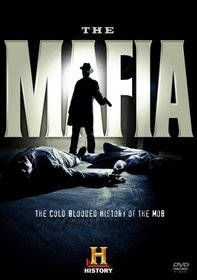| Actor: Mafia Director: History Genres: Television, Documentary Sub-Genres: Television, Documentary Studio: A&E Home Video Format: DVD - Color DVD Release Date: 07/28/2009 Release Year: 2009 Run Time: 10hr 50min Screens: Color Number of Discs: 4 SwapaDVD Credits: 4 Total Copies: 0 Members Wishing: 1 Edition: Box set MPAA Rating: NR (Not Rated) Languages: English |
Search - The Mafia DVD Set on DVD
  | The Mafia DVD Set Actor: Mafia Director: History Genres: Television, Documentary NR 2009 10hr 50min Dive deep into the dark heart of the mob with this definitive 4-disc set from HISTORY. A sweeping saga of bloodshed, betrayal and big business, The Mafia offers a cold-blooded examination of organized crime in the 20th cen... more » |
Larger Image |
Movie DetailsSimilar Movies
|
Movie ReviewsThorough, historical, meticulous in telling the XXth century Pork Chop | Lisbon, Portugal | 12/18/2009 (5 out of 5 stars) "Mafia - The History Of The Mob In America (1993) is essential for
anyone wanting to get a historical grasp of gangsterism in the USA, without turning to a book. This series aired originally on the HISTORY channel (digital TV), with Bill Kurtis as host. The first DVD comprises 3 episodes, running over 45 minutes each, with professors and book authors commenting on various historical turning points. There's a modest amount of rare, vintage footage, mostly assisted by Hollywood movies of the past. The film is sympathetic to gangsters Jewish, Italian or Irish, for the simple reason that historically, each group had an axe to grind, whether it were Gentiles, the Italian central government on the mainland or the British Orangemen. It also suggests viewers accept the phenomenon, or at least, be neutral to it, the argument being that all those gangs did was meet a demand of the general public for entertainment, alcohol, narcotics, showgirls, prostitution and gambling. Those are the ends that the public demanded, and justified the means used to achieve them (contraband, mayhem, murder, corruption, payoffs, etc.) Booze operations are explained, centering around the independent but nearby island St Pierre Miquelon, with numerous swift boats importing goods into the USA under various circumstances. The Canadian arm of those operations is also mentioned, with a higher quality of merchandise. The Bahamas and Cuba were further supply hubs. There was transportation of goods from the marshes in Delaware to Philadelphia, mainly by truck, although sustaining losses from ambushes to cargo, etc. A long stretch of film centers around that city - the manufacturing center of the USA, machinery, assembly lines, products, with a long tradition of a wealthy social class and influential Republican party- that partied as hard as it worked. Some originally involved in boxing competitions and the bookie business - diversified into liquor distribution, from his pre-existing influence in saloons, political circles, prostitution, eventually completing the vertical integration between producer and consumer. The bullying sustained by renowned performers, dancers, comedians and musicians was the case in playing for specific nightclubs as opposed to others in that, the most famous, notorious and prestigious clubs were all mob operated and owned and fought for the best attractions. Task forces created to deal with the problem often ended in failure. This stemmed from the overall indifference of the population to Prohibition, despite a few successes, such as the arrest of dozens of high-ranking law administrators taking money, or 138 officers fired, the destruction of barrels of booze or raiding hideouts. Perhaps 8% of agents turned to the other side, joining gangs for more pay. Originally intended by Protestants to control other ethnic groups' behavior, it failed despite increasing liquor prices by a factor of 15. The birth of modern-day gangsterism centered around the 60 unloading docks in Brooklyn in 1920-25, controlled originally by Irish ethnic workers that extorted money for cargo and ships to operate safely, without interference or destruction. The lack of entitlements from the State by the population, allowed those groups to earn the gratitude of the destitute and poor from soup kitchens, vigilantism, and a helpdesk for various injustices. Al Capone earned his chops at this time, with Yale, later moving to Chicago. An analysis of Sicily is made, in terms of many well known criminals on that Island. At the same time, the Island had its own masterminds and head honchos, deciding on rules, justice, marriages, judges, law officers, loans, enforcing contracts, independently of mainland Italy or the central government's delegates, who not rarely were taken out. The poverty of the land was an issue, with a sulfur mine one of the few local job creators. The New Orleans story is briefly touched upon, as well of arrivees hired on the docks and fruit and vegetable open markets." |






